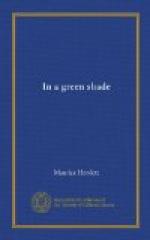Lady Jerningham, blue mother of a bluer daughter (Lady Bedingfield) and sister-in-law of the “Charming Man” of Walpole’s and the Misses Berry’s acquaintance, was a friend of Miss Betham’s of old standing. Several letters of hers are in A House of Letters, but many more of her daughter’s. Whether it was her ladyship’s or Miss Betham’s proposal there’s no telling now; but Miss Betham, at any rate, did not feel equal to the job, and called in Charles and Mary Lamb to help her. Mary, in the first instance, sounded the philosopher, and with success. I quote from Mr. Lucas’s edition of the Lamb letters, as the editor of Miss Betham’s misreads and misprints his original. “Coleridge,” she writes, “has given me a very cheerful promise that he will wait on Lady Jerningham any day you will be pleased to appoint. He offered to write to you, but I found it was to be done to-morrow, and as I am pretty well acquainted with his to-morrows, I thought good to let you know his determination to-day. He is in town to-day, but as he is often going to Hammersmith for a night or two, you had better perhaps send the invitation through me, and I will manage it for you as well as I can. You had better let him have four or five days’ previous notice, and you had better send the invitation as soon as you can; for he seems tolerably well just now. I mention all these betters, because I wish to do the best I can for you, perceiving, as I do, it is a thing you have set your heart on.”
Charles was next brought in. Mr. Lucas gives his letter (I. 429) to John Morgan, which says, “There—don’t read any further, because the letter is not intended for you, but for Coleridge, who might perhaps not have opened it directed to him suo nomine. It is to invite C., to Lady Jerningham’s on Sunday.”
Finally, Coleridge went to the party, and apparently in company, though it is not clear in whose company. This is what Lady Jerningham thought about it:—
“My dear Miss Betham,—I have been pleased with your friends, tho’ (which is not singular) they sometimes fly higher than my imagination can follow. I think the author ought to mix more, I will not say with Fools, but with People of Common Comprehension. His own intellect would be as bright, and what emanated from it more clear. This is perhaps a very impertinent Remark for me to venture at making, but your indulgence invited sincerity.”
That letter, I think, whose capitals are particularly graphic, throws the whole party up in a dry light. One can see the rhapsodist talking interminably, involving himself ever deeplier in a web of his own spinning; the great lady gazing in wonder. It is one of the very few impartial witnesses we have to his conversational feats. Nearly all the evidence is tainted either by predisposition in his favour or the reverse. Hazlitt, a mainly hostile witness, says that he talked well on every subject; Godwin on none. One suspects




